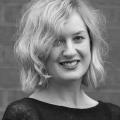
Packaging up this period into a triumphant time capsule of a play is London Road writer Alecky Blythe, whose new verbatim tour de force Our Generation is the conscientiously edited result of 656 hours of recorded interviews with 12 young people living across the UK in south London, north Wales, Cambridgeshire, Birmingham, Belfast and Glasgow.
Over nearly four hours, we’re catapulted between stand-out fragments from these conversations, recorded by Blythe and a team of five ‘collectors’ – all verbatim artists following in her footsteps – who spent five years with their subjects.

Rachelle Diedericks (Ierum), Anushka Chakravarti (Ayesha), Stephanie Street (Luljeta) & Anna Burnett (Robyn) in Our Generation at the NT. Photo: Johan Persson
A brilliant ensemble of 12 young actors bring the participants to life, each portraying their own character and stepping in as the friends, siblings and antagonists of the others. Supporting them are three older, seasoned cast members, Debbie Chazen, Hasan Dixon and Stephanie Street, who play a parade of parents and teachers, shrugging on different accents and demographics with effortless ease.
On a largely black, blank stage, lit by Zoe Spurr’s chalk-like beams of light, the participants break the fourth wall to talk to us, responding to prompts from Blythe and her team, whose questions we neither hear nor need to in order to follow the flow of conversation. When one sexually awakened teen goes to show us his love bites, his swift backing down could have only been in response to a polite but firm ‘no thank you’ from his collector.

Hélder Fernandes (Luan) and Dee Ahluwalia (Zac, Drin) in Our Generation at the National Theatre. Photo: Johan Persson
It’s endearingly funny, with much of the humour coming from the subjects’ innocent understanding of the world around them and their struggle to imagine life beyond school. It’s speckled with dazzling one-liners too, like Mia (a fittingly chaotic Sarita Gabony) stating: ‘My nails are longer than my future.’
Yet the personal information offered up anecdotally tells a wider story of the disparities within the British teenage experience, depending on wealth, race, religion and physical ability. Lucas (a wet-behind-the-ears Joe Bolland) and Emily (a fraught Poppy Shepherd) are growing up at a slower, more sheltered pace in boarding school than, say, Mia, who gets into an abusive relationship with a controlling older man while still a minor. Differing views between generations are touched on too, especially in relation to being brought up in a migrant family. Basketball prodigy Luan, and Brummie siblings Ali and Ayesha, in particular, juggle their British identities with the customs of their parents’ birth countries.

Anushka Chakravarti (Ayesha) and Gavi Singh Chera (Ali) in Our Generation at the National Theatre. Photo: Johan Persson
Commonalities between the teens are also emphasised. Movement director Carrie-Anne Ingrouille has the 12 sync up as a pack, flowing with youthful, loose-limbed energy as they tell us about the importance of phones in their lives, how body-image pressures have affected their confidence or how the frustrations of lockdown led to mild insomnia and mindless scrolling on their phones in the middle of the night.
We hear their views on Trump (who scares them), Brexit (which most think is stupid) and of course the pandemic. The latter forms the backdrop of the third and final part of the play, and in a piece of clever design by Vicki Mortimer (set) and Akhila Krishnan (video), is part digitalised, with the subjects speaking via projections onto giant phone screens as the conversations shifted onto Zoom.
This critic was left frustrated by the Almeida's recent revival of teen musical Spring Awakening, arguing the team missed a trick in not making it feel relevant or contemporary. Our Generation is both. Blythe presents an honest, heartfelt snapshot of the teenage experience, as told by them.
| What | Our Generation, National Theatre review |
| Where | National Theatre, South Bank, London, SE1 9PX | MAP |
| Nearest tube | Waterloo (underground) |
| When |
23 Feb 22 – 09 Apr 22, 7:00 PM – 10:45 PM |
| Price | £10 - £55 |
| Website | Click here for more information and to book |



